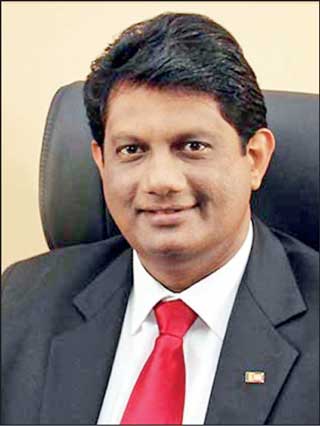Tuesday Feb 24, 2026
Tuesday Feb 24, 2026
Friday, 8 September 2023 00:30 - - {{hitsCtrl.values.hits}}
 |
| MP Dr. Nalaka Godahewa |
MP Dr. Nalaka Godahewa yesterday in a candid press conference held at the Nidahasa Office at Nawala addressed the implications of the new Inland Revenue Amended Act as well as Sri Lanka’s ongoing financial turmoil.
He provided a stark analysis of the country’s deepening debt crisis and highlighted the critical need for comprehensive reform.
Dr. Godahewa noted that instead of making progress towards escaping the debt trap, the nation appears to be sinking further into it. He presented a sobering overview of the nation’s debt trajectory, starting with a total debt of $24 billion in 2005, which had surged to an alarming $96 billion by June 2023. This debt encompasses both foreign and domestic obligations, painting a grim picture of the nation’s financial health.
One of the most significant concerns raised by Dr. Godahewa was the government’s intention to raise the annual borrowing limit by a staggering Rs. 9 trillion. This move indicates a willingness to take on even more debt, further exacerbating an already precarious situation, he claimed.
Dr. Godahewa also delved into the intricacies of the domestic debt crisis, with a focus on the government’s staggering domestic debt of Rs 13.2 trillion as of June. Of this, Rs. 4 trillion was in Government Treasury Bills and Rs. 8 trillion in Treasury Bonds. He highlighted the proposed measures, such as delaying loan repayments and reducing interest rates, which could impact entities like the Employee Provident Fund (EPF) and its members.
Furthermore, Dr. Godahewa elucidated on the Government’s revenue amendment bill that seeks to convert investments made by the EPF and other pension funds into restructuring bonds. “What was initially presented as a voluntary option for these funds has now evolved into a mandatory decision. The Government aims to impose a 30% tax rate on pension funds unless they agree to the proposed debt restructuring, at which point they can maintain a 14% tax rate. This coercive approach by the Government has raised concerns about the lack of alternative solutions,” said Godahewa.
While some may hastily place blame on President Gotabhaya Rajapaksa for the foreign debt crisis, Dr. Godahewa opined that the inherited challenges faced by the current administration. He pointed to 2021 as a year of significant economic growth, even amidst the COVID-19 pandemic, with a 3.7% expansion. However, the subsequent year saw difficulties in managing a substantial foreign debt of $6.9 billion.
He also touched upon the adverse effects of changes in the country’s tax policy in 2022, resulting in economic contraction by 7.8% in the same year and a staggering 11.5% contraction in the first quarter of 2023. These figures underscore the urgency of addressing the economic crisis.
“Two critical issues facing the nation were highlighted. First, the budget deficit remains a substantial challenge, with state income falling short of expectations by 23%. Second, the balance of payments deficit underscores the inadequacy of foreign income to cover expenses, with a 12% decrease in export income over the past six months,” Godahewa said.
He also shed light on the multifaceted challenges plaguing the nation’s economy. The need for comprehensive reform, beyond reliance on borrowing and taxation, was emphasized. The alarming exodus of the IT industry, declining tourism revenues, and a struggling export sector underscored the urgency of addressing these issues. The brain drain across various sectors is also affecting the nation’s long-term prospects.
All these factors are taking a toll on our economy, and without addressing these underlying issues, the government’s only recourse seems to be borrowing more and increasing taxes.
“It’s crucial for us as citizens to understand the complexity of our nation’s financial challenges and hold our government accountable for finding sustainable solutions that don’t disproportionately burden our people. burden our people,” Dr. Godahewa emphasised.